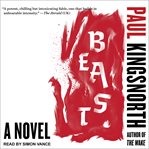Review by New York Times Review
"BEAST" is narrated by a tramp and would-be mystic, Edward Buckmaster, living alone in a ruined farmhouse on an English moor. He speaks fluently of the hermitages of Saints Anthony and Cuthbert. We first meet him standing alone in a freezing river, a kind of autobaptism. It is never made clear if some sin is driving him - he seems to have fantasized about assaulting a woman and killing her child - or if he is just someone too eccentric to function in society. "Beast" is the second installment of a promised trilogy. The first, the prize-winning novel "The Wake," is the story of Buccmaster of Holland, who fights Norman invaders across a similar English moor in the 1060s. The association is loose enough that presumably each volume can stand alone. Kingsnorth's latest features a variation on the same protagonist a millennium later, in the present day. While attempting to repair his tarpaulin roof during a storm, Buckmaster seems to lose consciousness, as his narration drops off abruptly. When readers next meet him - it is unclear how much time has passed - he is badly injured. He is also entirely alone, and the laws of nature have been suspended. As he gradually regains his strength over time under a sun that seems never to set, he takes the familiar road to town, only to find himself again and again near the church where he started. This world, although "white and new and washed clean," is nevertheless a place of inherent enmity, where even such normally benign beings as trees "sprout up from the Earth they reach out in all directions they reach out for you they will smother you they will never stop growing and dividing and colonising." It is also a place with limited punctuation, presumably part of Kingsnorth's strategy to create language to match his narrator's mental state. Other tactics include beginning and ending sections of the book midword, and imposing a temporary moratorium on capital letters. Near the church that Buckmaster can't seem to escape, he spots "some kind of animal" - or does he? He finds little evidence the sighting was real, and a full quarter of the novel passes before he gets another brief look at "the thing that walks." Even then, the creature is a mystery: "It was not a dog or a deer or a fox or a badger." Buckmaster, like a latter-day Adam, wants "to name this place and all the things in it," so he sets out on a quest, the as-yet unnamed thing his Questing Beast. When Buckmaster is not hunting for what turns out already to have a name - "a big cat a big black cat a big black cat with yellow eyes" - he drinks mug after mug of water, scrounges berries, rants that God is a "tyrant" and ponders the nature of creation, asking, "What if each of us is everything?" He has what might be either dreams or flashbacks. This blurring of memory and invention means Buckmaster's past remains as opaque as his present. In these moments, Kingsnorth forces readers to ask some central questions: Is Buckmaster a visionary or a sad lunatic? Is his story one of salvation, or an indictment of the false promise of heaven in the face of worldly unhappiness? And is "Beast," like the "thing that walks," something less exotic than at first it seems? Tadzio koelb'S debut novel, "Trenton Makes," will be published next spring.
Copyright (c) The New York Times Company [September 17, 2017]

